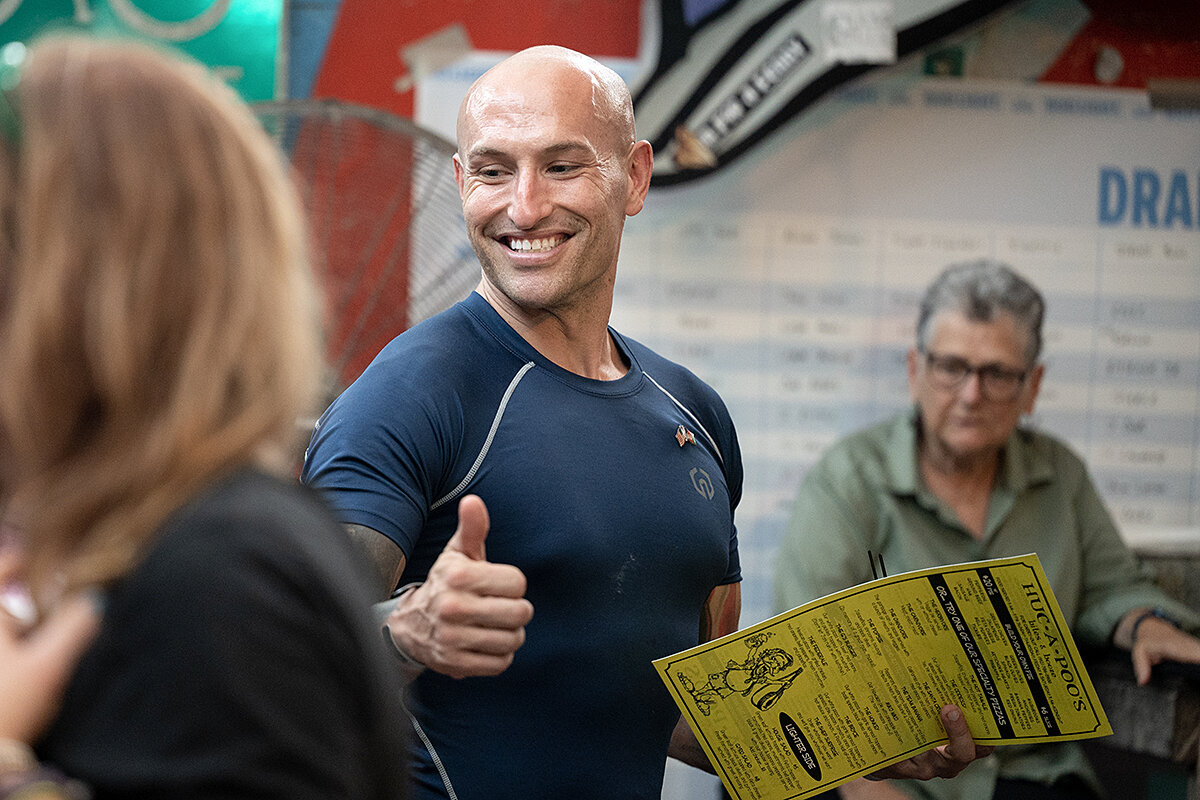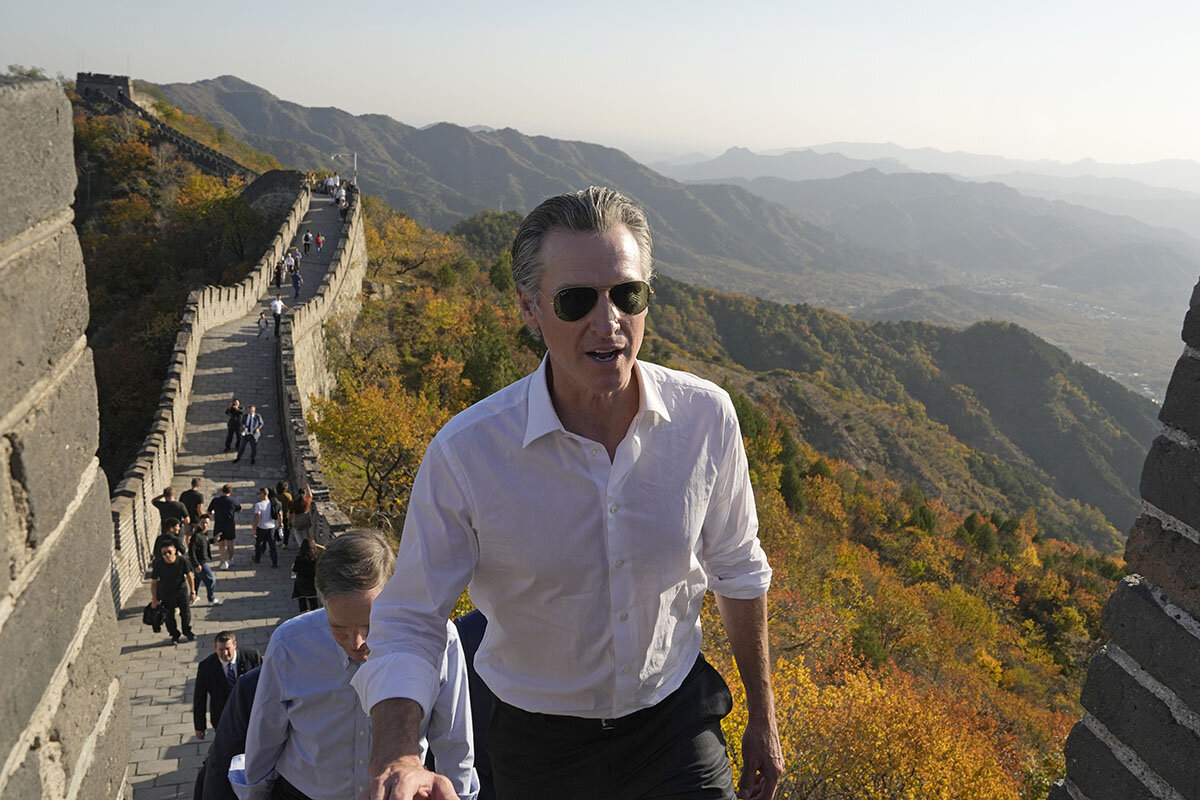In times of war, nations normally rally around their leader. But in Israel, Prime Minister Benjamin Netanyahu’s numbers are plummeting. The anger people felt before the war over a series of controversial moves has not dissipated. That’s uncharted territory. But something fascinating is happening instead. Israelis are rallying around one another.

Why is Christian Science in our name?
Our name is about honesty. The Monitor is owned by The Christian Science Church, and we’ve always been transparent about that.
The Church publishes the Monitor because it sees good journalism as vital to progress in the world. Since 1908, we’ve aimed “to injure no man, but to bless all mankind,” as our founder, Mary Baker Eddy, put it.
Here, you’ll find award-winning journalism not driven by commercial influences – a news organization that takes seriously its mission to uplift the world by seeking solutions and finding reasons for credible hope.
Explore values journalism About usMonitor Daily Podcast
- Follow us:
- Apple Podcasts
- Spotify
- RSS Feed
- Download
 Mark Sappenfield
Mark Sappenfield
The news overnight from Gaza was numbingly bleak. Another Israeli airstrike hit the Jabaliya neighborhood. The Wall Street Journal declares, “Israel’s New Calculus: Strike Hamas Harder Than Ever.”
But veteran journalist-turned-professor Dan Kennedy also posted about the war. He wrote that there is “so much legitimately terrible news that it’s hard to be optimistic about the prospects for peace and justice. Yet it’s important that we try.”
Then he talked about the Monitor. He even had his class listen to our podcast and told them to look for other stories of hope. It’s worth a read.
Help fund Monitor journalism for $11/ month
Already a subscriber? Login

Monitor journalism changes lives because we open that too-small box that most people think they live in. We believe news can and should expand a sense of identity and possibility beyond narrow conventional expectations.
Our work isn't possible without your support.
Today’s stories
And why we wrote them
( 6 min. read )
( 5 min. read )
Does it matter that Russia has pulled away from a nuclear test ban treaty that the U.S. never ratified? That’s unclear. But Moscow’s increasingly bellicose talk about nuclear weapons has come with a realization, some say. The dialogue and deterrence of the Cold War era is worth trying to revive.
Patterns
( 5 min. read )
Here’s a different look at superpowers and responsibility. President Joe Biden is maintaining America’s historic support for Israel. But many nations crucial to American global influence want Israel to dial back its violent assault on Gaza. At a time when America’s global clout is already waning, Mr. Biden has tough choices ahead.
A deeper look
( 13 min. read )
Amid America’s culture wars, this is probably not a story you have heard much about. Gay politicians in the South are thriving, winning even in some of the deepest red districts. There is important nuance, but the trend shows how the narratives that drive so much of the nation’s political conversation don’t tell the whole story.
The Explainer
( 5 min. read )
We often think of climate action as huge or tiny – countries wrestling with monumental laws or you deciding how to sort your trash. But maybe that’s the wrong way to look at it. Maybe climate action is a web of connections, from towns to businesses to nations. And maybe states can play a role, too. California certainly thinks so.
The Monitor's View
( 2 min. read )
A new survey of 173 countries might be a helpful guide for the coming decision on who will rule the Gaza Strip if Israel’s military takes over the enclave of 2 million Palestinians. While the survey, by a Sweden-based think tank, confirms a steady decline in democracy worldwide, it also notes a countervailing trend – or “green shoots” – in a number of places where citizens have lately achieved lower levels of corruption.
For Palestinians in Gaza, such a hopeful sign of the irrepressible desire for clean governance could be a starting point in creating a new democracy.
Polls bear this out. Just months before the Oct. 7 attack on Israel by Hamas, an opinion survey found that 73% of Gaza residents believed the Hamas government to be corrupt. And that percentage had been rising, which may help explain one possible reason why the Islamist group launched the attack on Israeli civilians to provoke a response. After previous conflicts with Israel, Hamas’ popularity rose, even if temporarily, until Palestinians in Gaza again noticed corruption in their public institutions.
A poll of Gaza residents earlier this year, done by the Palestinian Center for Policy and Survey Research, found that 25% saw corruption as the first problem in their society. That is behind only the 38% who said the establishment of a Palestinian state should be the first goal.
“The vast majority of Gazans have been frustrated with the armed group’s ineffective governance as they endure extreme economic hardship. Most Gazans do not align themselves with Hamas’s ideology,” wrote Amaney Jamal and Michael Robbins, scholars at Princeton University, in Foreign Affairs last month.
The global survey on democracy, conducted by the International Institute for Democracy and Electoral Assistance, found anti-corruption efforts increasing in countries as diverse as Zambia and Ukraine. Much of that progress comes from informal actors who provide checks and balances on government, such as journalists, election organizers, and anti-graft activists.
Since the approval in 2003 of the United Nations Convention Against Corruption, the world has “united around a common vision for integrity, transparency, and accountability,” Ghada Waly, executive director of the U.N. Office on Drugs and Crime, said last month. Those qualities, she added, “are essential safeguards to protect the values of democracy, preserve the rights of everyone, and prevent breakdowns in the rule of law.”
Palestinians in Gaza, too, can rely on such safeguards to build a resilient state that commands both legitimacy and accountability.
A Christian Science Perspective
Each weekday, the Monitor includes one clearly labeled religious article offering spiritual insight on contemporary issues, including the news. The publication – in its various forms – is produced for anyone who cares about the progress of the human endeavor around the world and seeks news reported with compassion, intelligence, and an essentially constructive lens. For many, that caring has religious roots. For many, it does not. The Monitor has always embraced both audiences. The Monitor is owned by a church – The First Church of Christ, Scientist, in Boston – whose founder was concerned with both the state of the world and the quality of available news.
( 4 min. read )
Like biblical figures that came before us, we can progressively experience our God-given harmony and wholeness.
Viewfinder

A look ahead
We’re glad you spent time with us today. If you’re confused about the short intro or the long editor’s notes above every quick read, just look at yesterday’s Daily issue, where we explained some experimentation we’re doing this month.
For tomorrow, we’re planning a graphics story that looks at the rise of antisemitism worldwide – a trend that always bears watching, but particularly during the heightened tensions of the Israel-Hamas war.







